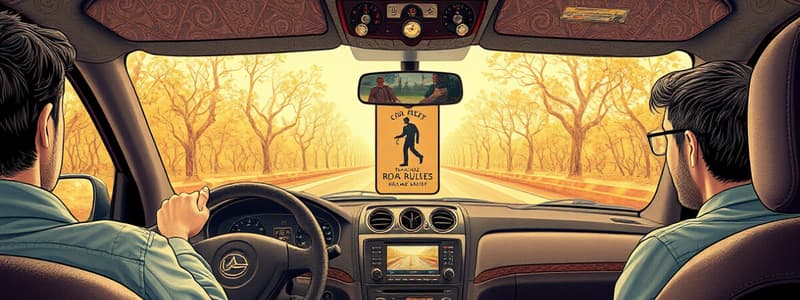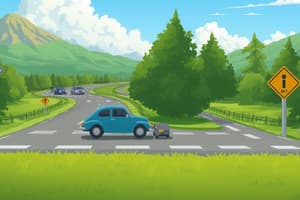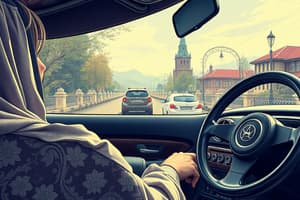Podcast
Questions and Answers
What should you do if your headlights fail?
What should you do if your headlights fail?
- Turn on your parking and hazard lights and exit the roadway immediately (correct)
- Follow the vehicle in front of you closer so you could see their headlights
- Pump your brakes so cars can see your brake lights and keep driving
- Pull off the road when it's convenient
Choose the common mistakes when backing up or driving in reverse.
Choose the common mistakes when backing up or driving in reverse.
- Failure to look before backing
- Failure to check blind spots
- Failure to conduct a walk-around
- All of the above (correct)
When driving a truck or SUV, you should:
When driving a truck or SUV, you should:
- Drive like you normally would in a car
- Take advantage of the increased power
- Drive slower in curves and allow more braking distance (correct)
- Feel secure because your vehicle is a massive battle wagon
The main goal of airbags is to:
The main goal of airbags is to:
Which of the following should you check weekly?
Which of the following should you check weekly?
The minimum tire tread that is acceptable by law is:
The minimum tire tread that is acceptable by law is:
You are not legally liable for accidents caused by mechanical failures on your vehicle.
You are not legally liable for accidents caused by mechanical failures on your vehicle.
You should always apply your parking brake every time your vehicle is unattended.
You should always apply your parking brake every time your vehicle is unattended.
Which of the following is a correct action in the event of a brake failure?
Which of the following is a correct action in the event of a brake failure?
Turn signals must be used in which of the following situations?
Turn signals must be used in which of the following situations?
Clear water leaking from the underside of your vehicle is likely coming from what?
Clear water leaking from the underside of your vehicle is likely coming from what?
ABS built into my car is intended to do what?
ABS built into my car is intended to do what?
How can you prevent brakes from locking if your vehicle does not have ABS?
How can you prevent brakes from locking if your vehicle does not have ABS?
Which of the following is something you should do every time you enter your vehicle?
Which of the following is something you should do every time you enter your vehicle?
In an accident, it is better to be thrown clear of the vehicle than wear a seatbelt and be trapped inside.
In an accident, it is better to be thrown clear of the vehicle than wear a seatbelt and be trapped inside.
Flashcards are hidden until you start studying
Study Notes
Headlight Failure
- If headlights fail, immediately turn on parking and hazard lights, then exit the roadway.
Mistakes in Reversing
- Common mistakes while backing up include failing to look, not checking blind spots, and neglecting a vehicle walk-around.
Driving Trucks or SUVs
- When driving larger vehicles like trucks or SUVs, reduce speed on curves and increase braking distance compared to cars.
Airbag Purpose
- Airbags are designed for additional protection during an accident, not to prevent the accident itself.
Weekly Vehicle Checks
- Important components to check weekly are oil levels and tire conditions.
Tire Tread Law
- The legal minimum tire tread depth is 2/32 inch.
Liability for Mechanical Failures
- Drivers can be held legally liable for accidents caused by mechanical failures of their vehicles.
Parking Brake Usage
- Always engage the parking brake when leaving your vehicle unattended.
Brake Failure Response
- In the event of brake failure, downshift to lower gears, pump the brakes, and apply the parking brake as needed.
Turn Signal Use
- Utilize turn signals when changing lanes, turning from a main road to a side road, or turning onto a road from a parking lot.
Water Leaks from Vehicle
- Clear water leaking from the vehicle typically indicates air conditioning condensation, not an oil or coolant leak.
Anti-lock Braking System (ABS)
- ABS prevents wheel lock-up during braking, enhancing vehicle control.
Braking Without ABS
- To prevent tire lock-up in vehicles without ABS, press the brakes hard, release slightly if the wheels lock, and repeat if necessary.
Pre-Drive Safety Checks
- Each time you enter a vehicle, fasten your seatbelt, adjust mirrors, and familiarize yourself with all controls.
Seatbelt Safety
- It is safer to wear a seatbelt than to be thrown clear of the vehicle in an accident.
Studying That Suits You
Use AI to generate personalized quizzes and flashcards to suit your learning preferences.




